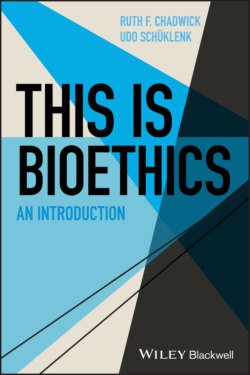Читать книгу This Is Bioethics - Udo Schüklenk, Ruth F. Chadwick - Страница 18
2.2 Feminist Ethics
Оглавление2.10 As the name suggests, feminist ethics5 takes a distinctly feminist approach to ethical issues. To be clear, to be a feminist ethicist you don’t have to be a woman6.
2.11 Early feminist voices included for instance the liberal utilitarian philosopher John Stuart Mill. Feminist ethics was born out of a frustration by many feminist thinkers about the very nature of mainstream ethics, a critique that to a certain extent overlaps with the critical program presented by virtue ethicists. The fundamental concern expressed here is that mainstream Western ethics is male dominated, asks questions that are the result of the unique life experiences of (heterosexual) men and comes up, not surprisingly, with solutions that are a consequence of these men’s life experiences. At the risk of oversimplifying this critique, the concern relates to the different spheres in which men and women operated for most of our histories. That is – with few known exceptions – men were in the public domain, they were usually the sole bread‐winners, they did politics, they were judges and entrepreneurs while women typically stayed behind at home, supported their husbands’ careers and/or looked after family and friends. Think for instance about Aristotle who thought it entirely appropriate for the male citizen to be his slaves’, wife’s and children’s supreme overlord. It cannot surprise then that his approach to ethics prioritizes male experiences over those of women, slaves and children. The lived experiences of women typically do not feature in such approaches to ethics. If you have any doubt about the misogynist state of affairs with regard to leading philosophical male thinkers in most mainstream philosophical traditions, you might want to spend a bit more time reading up on what common views were of the female sex. To give you a fairly representative voice, let us quote the influential eighteenth century German philosopher Georg Wilhelm Friedrich Hegel who claimed that ‘the difference between men and women is like that between animals and plants’ (Clement 2013, 1927).
2.12 Carol Gilligan wrote a very influential book that continues to impact significantly on what can best be described as an ‘ethic of care’ (Gilligan 1982; critical Kuhse 1997). Gilligan criticizes a Kant‐inspired moral psychologist, Lawrence Kohlberg. Kohlberg proposed a model of human moral development that fits right into the male ethics narrative mentioned already: universality, impartiality and principles feature prominently. Gilligan, on the other hand, proposes instead a female‐experiences inspired ethic that values relationships and the partiality that goes with them. Some critics questioned whether an ethic that is born out of women’s subordinate status over centuries is necessarily something worth supporting. Even if that wasn’t a problem, does feminist ethics actually meet our action‐guidance and action‐justification criteria? Perhaps it is not too dissimilar to virtue ethics. While there is good reason to listen to its criticism of what historically was considered Western ethics, it is less clear that it provides us with a reasonably clear roadmap to ethical action and justification for action guidance. No doubt though, the concerns that motivate feminist ethics, and perhaps even more so feminist bioethics, are well worth keeping in mind when we look at specific bioethical problems.
2.13 Margaret Little outlines why feminist bioethics7 is important to the bioethical enterprise: ‘First, it can reveal androcentric reasoning present in analyses of substantive bioethical issues – reasoning that can bias not only which policies are adopted, but what gets counted as an important question or persuasive argument. Second, it can help bioethicists to rethink the very conceptual tools used in bioethics – specifically, helping to identify where assumptions about gender have distorted the concepts commonly invoked in moral theory and, in doing so, clearing the way for the development of what might best be called "feminist‐inspired" moral theory’ (Little 1996). Feminist bioethicists have contributed influential works on a whole range of subjects ranging from reproductive health issues (Mackenzie 1992) to disability studies (Scully 2008), end‐of‐life decision‐ making and resource‐allocation justice (Sherwin 1992) among others.
